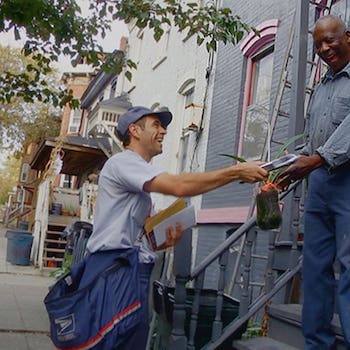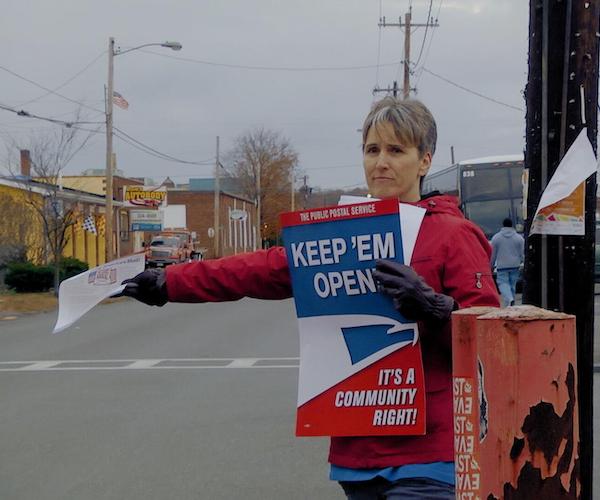Film Review: “The Great Postal Heist” — Clear and Present Danger to a Great American Institution
By Betsy Sherman
This effective advocacy documentary charts the 21st-century decline of a great American institution (one established in the US Constitution). It’s also a wake-up call alerting us that things didn’t have to happen this way.
The Great Postal Heist, directed by Jay Galione. Streaming on Vimeo, Video On Demand, and available on DVD (www.TheGreatPostalHeist.com)

A scene from The Great Postal Heist.
Jay Galione’s documentary exposé of issues surrounding, and within, the United States Postal Service, The Great Postal Heist, is illuminating and alarming. All this is accomplished without even getting to the tenure of the notorious current Postmaster General Louis DeJoy, since the film was shot from 2008 to 2019, before his appointment.
The advocacy doc depicts the 21st-century decline of a great American institution (one established in the US Constitution) and a wake-up call telling us citizen/consumers that things didn’t have to happen this way. But foremost, The Great Postal Heist is an eye-opening labor story. Interviewees include consumer advocate Ralph Nader, Marxian economist Richard Wolff, labor scholar Robert Hickey, and Massachusetts congressman Stephen Lynch. However, at the core are the personal stories of postal workers, many of whom came to the P.O. from lesser jobs at factories or shopping malls, lured by good pay, job security, and a chance to serve the public. They tell the filmmakers about their disillusionment as an atmosphere of pressure and bullying made the workplace nearly intolerable. Front and center here is Galione’s father, Bob, whose situation impelled Galione to make the film. Jay says, in voice over, he wanted to find out if “what happened to him is happening everywhere.”
Father and son are filmed in conversation outside the Maplewood, NJ, post office where Bob spent his 30-year career. You can feel his pride in being of service as a clerk, as well as a union shop steward. But once he turned 45, he was subjected to harassment by higher-ups; he was told that he’d be closely watched, until he “screwed up.” Then, he was accused of having stolen, over a period of 10 years, $579.15 in supposedly unjustified expenses. He was suspended, and it was a years-long process toward arbitration. Happy home movies from Jay’s youth are contrasted with scenes of Bob pouring over vouchers, meticulously accounting for every expense. Recalls Jay, “It took a big toll on him.”
This does, indeed, look to be happening “everywhere.” Other workers say that when they reached middle-age, they got squeezed. They were shocked by management’s encouragement to break safety rules in order to save time and expense. Overtime pay has been deleted from digital time-clock records. Sales representatives, who bring revenue into the USPS, describe a high-pressure system marked by favoritism, and retaliation for speaking out. One activist points at a filing cabinet full of work records that she keeps at home, for evidence in case she’s ever barred from her office. And yes, there is a union, but interviewees brand it as often ineffective or indifferent to workers’ complaints.
The grimmest testament reads “The post office won.” It’s in the suicide note of Steve Spencer, who in 2009 killed himself in the North Carolina post office in which he worked. As his widow and colleagues explain, management put workers under a high level of stress. Spencer, well-liked by his peers, was targeted, possibly because of his union activism. A tactic used to unnerve him was having his postal truck closely followed; the film includes a haunting image of postal trucks in a procession to a cemetery.
The Great Postal Heist includes a review of the labor record, starting with the 1970 wildcat strike in which workers went over the head of their union to air their grievances to the government and the people. They got many of their demands, and the present-day workers Galione interviews are grateful for their courage. But, as Ralph Nader points out, that action caused the Nixon administration to take the USPS out of the cabinet and onto the ruinous road towards privatization.
There’s a montage of news reports from the ’80s and ’90s of workers “going postal” from stress, violently taking out their bosses, co-workers and bystanders. The 2000s ushered in an era based on, as Galione puts it, “the hustle, the half truth that would justify the largest downsizing in US history.” As labor expert Robert Hickey explains, “The story that the decline of the post office coincides with the rise of Internet is too simplistic.” This perception that the post office was obsolete because people wrote emails instead of letters allowed a nefarious policy change to make it through Congress. The 2006 Postal Accountability and Enhancement Act (PAEA), required the USPS to prepay for the health and retirement benefits of its employees more than 50 years in advance. No other government agency has to do this. The Bush administration wanted to use this money to help reduce the federal deficit (a bill was introduced recently that would remove this burden). Heist, for sure.

A scene from The Great Postal Heist.
Corporations such as FedEx, Pitney Bowes, and Amazon, whose workers are not as well-compensated as postal workers, have been able to leech off USPS services. The film has footage of demonstrations during 2012 and 2013, during which time mini-post offices were opened in Staples stores. The picketers ask for respect for their experience and expertise. Another consequence of the downsizing is handsome old post office buildings being abandoned or sold (for not much, we’re told). It’s people in rural areas that are being hurt the worst by the loss of services.
The DVD of The Great Postal Heist includes a Q&A done by Galione and producer Sheila Dvorak for the Workers Unite Film Festival. This gives an update into 2020 and the pandemic. The new — at that time — postmaster general, Louis DeJoy (whom, by the way, President Biden can’t fire) and his radical right-wing agenda are mentioned.
One quibble I have is that the documentary would have been an easier watch with some kind of walk-through, providing a clear delineation of whom we’d be meeting. A series of graphics, or a tad more voice-over, would have been welcome.
Near the film’s conclusion, economist Wolff offers a vision of self-managed teams of employees doing their work without all the onerous layers of supervision. It’s an inspiring thought, and would be the ultimate show of respect. But obstacles like the PAEA and DeJoy abide — for now.
Betsy Sherman has written about movies, old and new, for the Boston Globe, Boston Phoenix, and Improper Bostonian, among others. She holds a degree in archives management from Simmons Graduate School of Library and Information Science. When she grows up, she wants to be Barbara Stanwyck.
Tagged: Betsy Sherman, Jay Galione, The Great Postal Heist, US Postal Service

My friends that do not work in the Postal Service bought me the DVD. I have my own problems with the postal service my case is headed to court after 15 years and more of abuses. I experienced Sexual Harassment (unwanted touching) I was not the only one just the only one touched. After speaking up I experienced the worst of Retaliation, Racism, Harassment, even Fraud , Forgery and constant abuse of Power. I filed numerous Eeos that went no where , grievances went no where . There is no accountability for these supervisors. I reached out to so many legislators. Two of the legislators told me not to leave until I was given my back pay. The reason why because I was set up put out of work for two years. The postal service did not want my sexual harassment case to go to court. I was brought back just to have a union business agent fraud me out of my back pay. I Proved the document was a fraud with a forged signature. A friend of mine notice it and I had a forensic expert confirm it. The document was then sent to the Attorney Generals office just to be covered up by postal inspectors. I suffered a nervous breakdown and ended up with Breast Cancer that does not run in my family. The harassment never stopped all I could do was document everything. Not one legislator did anything except send my info to the postal service then I would receive more retaliation. My story as my attorney describes is Global. Yes I still remain working watching my back and looking to my court date. I am spreading the word about this film. Thank you it lets me know I am not alone. I describe my office as a new day plantation/ working prison. I look forward to writing a book about all the awful things that were done to me even as a Breast Cancer patient. Thank you
!Systemic!
Privatize Privatize Privatize
Monetize Monetize Monetize
Capitalize Capitalize Capitalize
Cannibalize Cannibalize Cannibalize
Privatize Privatize Privatize
Consumerism
greed hoard, hoard greed,
covetousness avarice
materialism
merciless ruthlessness
Cannibalize Cannibalize Cannibalize
Colonial capitalism in all its glory
usa favor
The way the species of ‘man’ treats one another
to them is grand.
Appalling
To say the least; yet the species of ‘man’ proclaims divine majesty
All the while destroying All that that is life itself
Privatize Privatize Privatize
Capitalize Capitalize Capitalize
Cannibalize Cannibalize Cannibalize
Privatize Privatize Privatize
Monetize Monetize Monetize
Consumerism
greed, hoard, hoard, greed,
Covetousness avarice
Materialism
Merciless ruthlessness
Cannibalize Cannibalize Cannibalize
Colonial capitalistic carnage in all its glory
Proudly
depriving life for ‘individual’ momentary gain.
The pride of ‘Man’